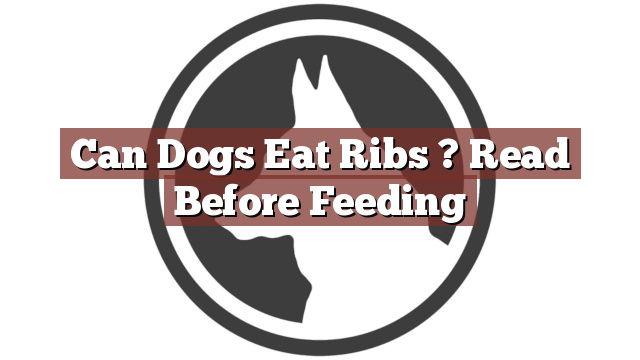Understanding Your Dog’s Dietary Needs
As a responsible pet owner, it is crucial to understand your dog’s dietary needs. Providing the right nutrition is essential for their overall health and well-being. While dogs are primarily carnivorous, their dietary requirements can vary based on breed, size, age, and activity level. It is important to consult with a veterinarian to determine the best diet for your furry friend.
Can Dogs Eat Ribs? Read Before Feeding
Can dogs eat ribs? It’s a question that many pet owners may have, especially when enjoying a delicious rack of ribs themselves. The answer is both yes and no. While dogs can technically eat ribs, it is not recommended to feed them this food regularly.
Yes, dogs can eat ribs, but only in moderation and with precautions. Ribs, particularly the cooked ones, can pose potential risks to your dog’s health. Cooked ribs often have seasonings, spices, or sauces that can be harmful. Additionally, cooked bones, especially small and splintered pieces, can pose a choking hazard or cause internal damage to your dog’s digestive system.
Pros and Cons of Feeding Ribs to Dogs
Feeding ribs to your dog comes with both pros and cons. Let’s take a closer look at these:
Pros:
-
Source of protein: Ribs are a good source of protein, which is essential for your dog’s muscle development and overall health. However, it is important to ensure that the meat is properly cooked, unseasoned, and free from any spices or sauces that may be harmful.
-
Occasional treat: Feeding your dog a small, unseasoned piece of rib meat as an occasional treat can provide them with a delicious and satisfying experience. It can also help strengthen the bond between you and your furry companion.
Cons:
-
Seasonings and sauces: Many rib recipes involve the use of seasonings, spices, or sauces that can be harmful to dogs. Ingredients like garlic, onions, and certain herbs can be toxic and should be avoided.
-
Choking hazards and bone splintering: Cooked rib bones can splinter easily, posing a choking hazard or causing internal injuries if swallowed. It is crucial to remove all bones and cartilage before offering any rib meat to your dog.
To keep your dog safe, it is advisable to avoid feeding them ribs altogether or only offer a small amount of unseasoned, cooked meat as an occasional treat. Always consult with your veterinarian before introducing any new food into your dog’s diet.
Conclusion
In conclusion, dogs can eat ribs to a certain extent, but it is not recommended to make them a regular part of their diet. While ribs can provide protein and be a tasty treat for your furry friend, they also come with potential risks such as seasonings, sauces, choking hazards, and bone splintering. As a responsible pet owner, it is crucial to prioritize your dog’s health and consult with a veterinarian to ensure their dietary needs are met safely and appropriately.
Thank you for taking the time to read through our exploration of [page_title]. As every dog lover knows, our furry friends have unique dietary needs and responses, often varying from one canine to another. This is why it's paramount to approach any changes in their diet with caution and knowledge.
Before introducing any new treats or making alterations to your dog's diet based on our insights, it's crucial to consult with a veterinarian about [page_title]. Their expertise ensures that the choices you make are well-suited to your particular pet's health and well-being.
Even seemingly harmless foods can sometimes lead to allergic reactions or digestive issues, which is why monitoring your dog after introducing any new food item is essential.
The content provided here on [page_title] is crafted with care, thorough research, and a genuine love for dogs. Nevertheless, it serves as a general guideline and should not be considered a substitute for professional veterinary advice.
Always prioritize the expert insights of your veterinarian, and remember that the health and happiness of your furry companion come first.
May your journey with your pet continue to be filled with joy, love, and safe culinary adventures. Happy reading, and even happier snacking for your canine friend!

